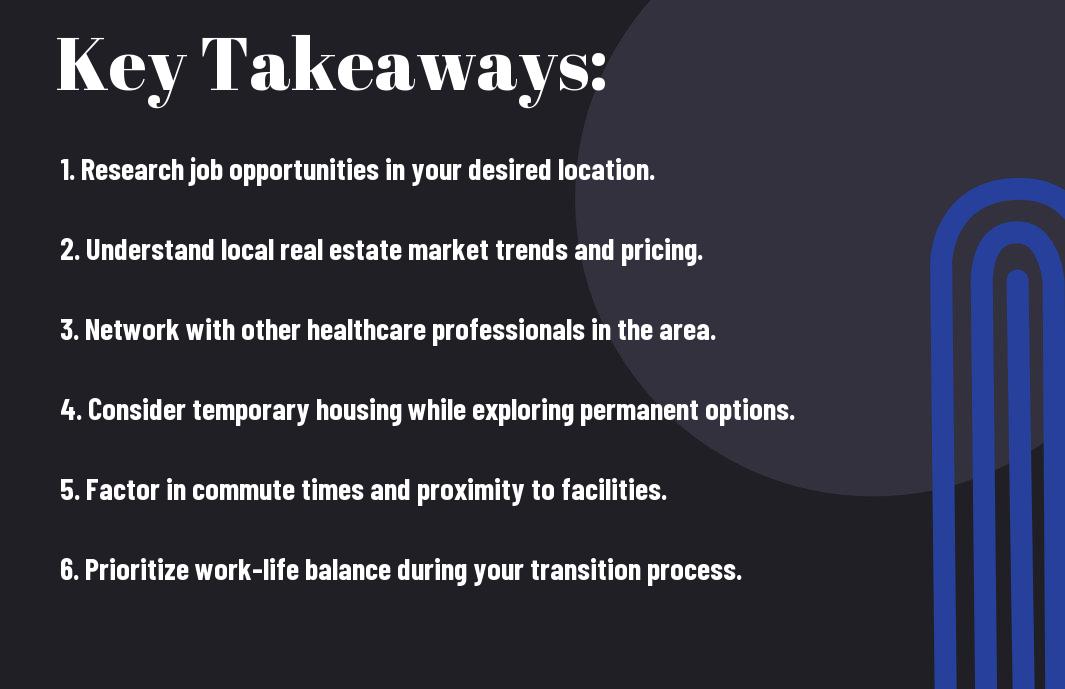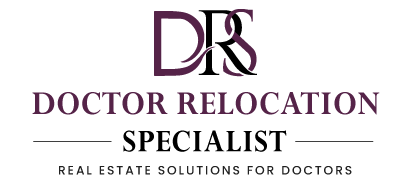There’s a lot to consider when you decide to relocate as a healthcare provider, from navigating employment opportunities to addressing your real estate needs. Your career transition could come with challenges, but understanding how to balance these aspects can pave the way for a smooth move. Whether you’re looking for the right community or the ideal home, strategically planning your relocation will not only support your professional aspirations but also ensure your personal life aligns with your new role. Let’s explore the key steps to seamlessly integrate both your career and living arrangements.
Understanding Relocation as a Healthcare Provider
While relocating as a healthcare provider can present unique challenges, it also offers opportunities for personal and professional growth. Adapting to a new environment not only impacts your lifestyle but also affects your career path. You must navigate various factors to ensure a smooth transition that aligns with your aspirations and goals.
Factors Influencing Your Move
With numerous aspects to consider, your decision to relocate may involve various influences. Factors can include:
- Job opportunities in your specialty
- Cost of living in the new location
- The availability of quality healthcare facilities
- Work-life balance
The decision-making process will require thorough research and analysis of how each factor impacts your life and career.
Impact on Career Advancement
Among the many benefits of relocating, you may find significant opportunities for career advancement. Transitioning to new regions often leads to access to diverse professional networks and increased visibility within the healthcare community.
Your relocation can be a stepping stone for enhancing your skill set, expanding your patient base, and broadening your professional connections. By immersing yourself in a different healthcare landscape, you may uncover unique training or specialized services that bolster your career trajectory. Consider these aspects to maximize the benefits of your move as a healthcare provider.

Assessing Real Estate Needs
If you are transitioning to a new area as a healthcare provider, it’s imperative to assess your real estate needs meticulously. This involves evaluating your budget, proximity to your workplace, and other lifestyle preferences. By taking these factors into account, you can ensure that your new living environment aligns with both your professional obligations and personal comforts.
Finding the Right Location
Across the myriad of choices available, selecting the ideal location is paramount for your career and well-being. Consider the accessibility of local hospitals and clinics, quality of schools, recreational facilities, and community vibe. Balancing proximity to work with neighborhood amenities can enhance your overall experience in your new environment.
Types of Housing Options Available
Available housing types can significantly impact your settling-in process. Evaluating the various options ensures you find the perfect fit for your lifestyle and financial capabilities. Here’s a breakdown of some common housing types:
| Single-Family Homes | Ideal for families seeking more space and privacy. |
| Townhouses | Great for those wanting a balance of community living and independence. |
| Condos | Perfect for those looking for low-maintenance living. |
| Apartments | Suitable for individuals or small families desiring urban living. |
| Rural Homes | For those preferring a quieter lifestyle away from the city bustle. |
- Consider your financial capacity when choosing a housing option.
- Evaluate the neighborhood’s safety and amenities.
- Research local real estate trends for informed decision making.
- Think about proximity to your workplace for daily commuting.
- Investigate any rental or purchase incentives in the area.
Knowing these options will help you make an informed decision about what fits your lifestyle best.
Further delving into housing options highlights the nuances of each category. Understanding the benefits and drawbacks of each style can guide you toward a choice that best supports your professional and personal life. Here’s a more detailed look:
| Single-Family Homes | Offers extensive yard space and privacy. |
| Townhouses | Shared walls but typically have more community features. |
| Condos | Come with amenities like pools and gyms; less upkeep. |
| Apartments | Often in central locations, providing urban convenience. |
| Rural Homes | More space and tranquility, ideal for nature lovers. |
- Your budget will play a significant role in determining the right housing type.
- Neighborhood dynamics can affect your overall living experience.
- Your career needs may influence the proximity and type of housing.
- Community engagement levels vary among different housing styles.
- Consider long-term appreciation when making an investment.
Knowing these aspects allows you to align your housing decision with your lifestyle and career objectives seamlessly.
Navigating the Job Market
Many healthcare providers face unique challenges when relocating, particularly when it comes to securing employment in a new area. Understanding the local job market is crucial for aligning your skills with appropriate opportunities. Conduct thorough research on healthcare institutions, market demands, and regional trends to streamline your transition and enhance your chances of securing a suitable position.
Identifying Opportunities in New Locations
Above all, be proactive in identifying job openings in your new location. Utilize online job boards, local healthcare websites, and professional associations to gather information and apply for roles that match your expertise. Tailor your application materials to highlight relevant experience and express adaptability to higher competition in new markets.
Networking and Professional Connections
Behind every successful job transition is a robust network of professional contacts. Building relationships with local healthcare providers, attending industry conferences, and engaging in community events can help you gain valuable insights and referrals, significantly easing your path to employment.
But networking isn’t solely about finding jobs; it’s about forming lasting connections. Engaging with other professionals in your field can provide mentorship and guidance, as well as access to opportunities not publicly advertised. Join local healthcare associations or online groups specific to your area of expertise. By establishing your presence and reaching out to fellow providers, you can position yourself favorably in the new market while building a supportive community around your career.
Transitional Support Resources
Your relocation as a healthcare provider can be significantly eased by utilizing various transitional support resources. Familiarizing yourself with these resources can enhance your career transition, ensuring you have the necessary support while juggling real estate needs and professional integration in your new location.
Relocation Assistance Programs
After deciding to move, explore relocation assistance programs offered by healthcare institutions or organizations. These programs often provide resources for moving costs, housing assistance, and local integration, making your transition smoother and more manageable.
Professional Organizations and Mentorship
By connecting with professional organizations and seeking mentorship, you can tap into valuable resources tailored to your career development. These networks offer support, guidance, and opportunities to foster relationships that enhance your professional journey.
Even as you navigate the complexities of relocating, engaging with professional organizations can provide access to a wealth of information about job opportunities, continuing education, and industry trends. Mentorship is also invaluable, offering insights and advice from experienced professionals who have successfully transitioned themselves, helping you to avoid common pitfalls and make informed decisions.
Balancing Personal and Professional Life
Not only is a successful career transition important, but maintaining a healthy personal life is equally vital as you relocate. Finding that balance will allow you to thrive both personally and professionally, ensuring that neither aspect suffers during this significant change. Prioritizing self-care and allocating time for family and social connections will help you navigate this complex transition smoothly.
Family Considerations
Against the backdrop of your professional transition, considering your family’s needs is vital. Engaging your loved ones in the relocation process ensures that everyone feels involved and valued. Assess their preferences regarding school systems, recreational opportunities, and community support to enhance their adjustment and happiness in the new location.
Community Integration
Before exploring into your new role, it’s vital to immerse yourself in the community to establish a support network. Getting involved with local groups, attending events, and volunteering can help you connect with others who share your interests, creating a sense of belonging.
Consequently, building relationships within your new community can significantly enhance your overall experience as a healthcare provider. Establishing connections not only helps with personal fulfillment but also opens up networking opportunities that can benefit your professional life. Engaging with local events or joining professional associations will help you stay informed about trends and initiatives within the healthcare landscape, furthering your growth and integration.

Financial Implications of Relocation
Now that you’re considering a relocation as a healthcare provider, it’s crucial to evaluate the financial implications involved. The shift can impact your salary, employment benefits, and overall financial well-being. Assessing these factors helps you make an informed decision, ensuring that your move aligns with your long-term career goals and lifestyle needs.
Salary Variations by Region
To effectively plan your relocation, you need to research the variations in salary based on the region you plan to move to. Each state or city typically offers different compensation packages influenced by the demand for healthcare professionals, local industry standards, and living costs. Understanding these factors can help you negotiate a suitable salary that meets your financial goals.
Cost of Living Adjustments
Cost adjustments are an crucial aspect of your relocation budgeting process. They vary significantly across regions, impacting how far your salary will stretch and your overall financial comfort.
Understanding the cost of living in your new location is vital for a successful transition. Expenses such as housing, transportation, groceries, and healthcare can differ widely from your current situation. By conducting a detailed comparison, you can effectively adjust your budget and negotiate your salary to ensure that your new position not only meets your professional aspirations but also supports your desired lifestyle.
To wrap up
Upon reflecting, relocating as a healthcare provider presents both exciting opportunities and unique challenges that require careful planning. You must navigate not only your career transition but also the real estate needs that come with it. By effectively balancing these aspects, you can ensure a smoother relocation process, allowing you to focus on your new role and environment. Consider establishing a strategic plan that incorporates both your professional goals and housing requirements, ensuring a harmonious balance as you launch on this new chapter in your life.

